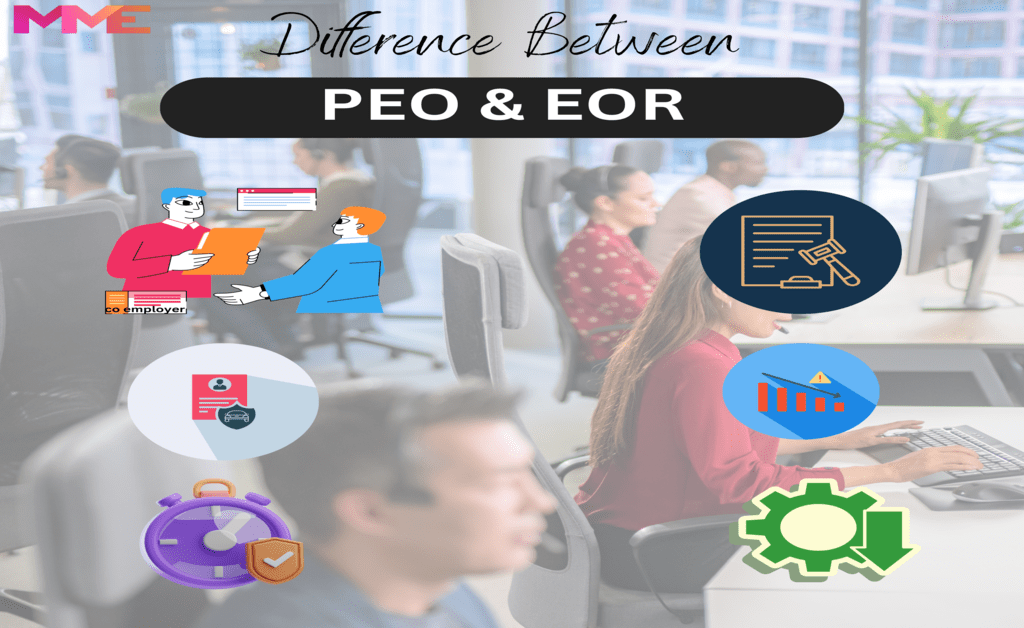Introduction
Finding efficient ways to manage human resources and streamline workforce procedures is essential in the fast-paced, constantly-evolving business world. Employer of Record (EOR) services and Professional Employer Organisations (PEOs) are two frequently mentioned solutions for outsourcing HR duties. For business owners and HR professionals looking for the best fit for their unique needs, understanding the difference between PEO and EOR becomes crucial.
A PEO, also referred to as a professional employer organization, serves as a full-service partner in HR outsourcing. Payroll management, benefits administration, compliance, and employee relations are just a few crucial tasks they do. However, Employer of Record (EOR) services adopt an alternative strategy. By handling duties including processing payroll, collecting taxes, and managing employment contracts, EORs act as the company’s official employers for its personnel.
The size of the organization, specialized HR requirements, and long-term business objectives are only a few of the considerations when choosing between PEO and EOR services. PEO or EOR solutions offer several benefits over conventional HR administration. By utilizing knowledge, technology, and economies of scale, PEOs give clients access to a full range of HR services. EOR services, on the other hand, provide a simple and legal way to manage a worldwide workforce without having to deal with the difficulties of forming legal companies across numerous countries.
The details and advantages of PEOs and EORs will be covered in more detail in the article, emphasizing the fundamental differences. By doing this, we hope to assist you in choosing the solution that best suits your business requirements. Consequently, let’s start working together to clarify these two HR outsourcing options and determine which route can result in your company’s most outstanding performance and operational efficiency. Keep reading to learn about every difference between PEO and EOR!
Difference Between PEO and EOR: What is PEO?

PEO and EOR may seem the same, but the difference between PEO and EOR is worth knowing. In a shared or co-employment model, a professional employer organization (PEO) acts as the administrative employer for the staff members of its clients. Due to this arrangement, PEOs can take on duties related to payroll, taxes, human resources, adherence to employment legislation, and risk management. PEOs can reduce associated costs and lessen the HR burden for their client organizations by taking on these duties.
The economies of scale that PEOs provide are one of the main benefits of working with them. PEOs frequently have the power to negotiate lower insurance rates and offer more attractive benefit packages than individual clients can independently secure because of their size and specialization. It’s crucial to remember that the client business continues to serve as the employee’s operational employer, maintaining authority over recruiting, firing, employee job duties, compensation, daily operations, and overall strategic direction. To free up the client to concentrate on their core strengths, the co-employment partnership is meant to outsource everyday HR activities and compliance.
More on PEOs
PEOs often charge an administration fee, sometimes expressed as a per-employee-per-month (PEPM) or occasionally as a percentage of the client’s gross salary. Under the appropriate conditions, PEOs may be a potent tool for businesses, allowing them to offload HR obligations, gain cost savings, and access specialized expertise. Utilizing PEO’s services will enable companies to streamline operations and concentrate on their core capabilities, eventually leading to development and success.
In 2020, the professional employer organizations (PEOs) market in India had a value of USD 1,232.8 million, and by 2027, it is projected to have grown to USD 2,710.5 million, with a CAGR of 12.4%. A PEO can ease the following HR-related burdens:
- Benefits administration.
- Recruiting and hiring.
- Payroll administration.
- Unemployment administration.
- Workers’ compensation administration.
- Compliance assistance.
- Drug testing programs.
- Family and Medical Leave Act administration.
Benefits of PEO Services

Administration of Benefits:
PEOs provide helpful guidance to help businesses succeed in addition to managing HR-related chores. They help establish customer service teams, effective onboarding and training programs, hiring implications, payroll, and benefit alternatives.
Employee perks:
PEOs strive to offer affordable employee benefits by combining the workforces of many enterprises. They handle employee enrollment and benefit-related questions and arrange reasonable medical, dental, and life insurance coverage costs.
Worker’s compensation:
Professional employer organizations frequently handle workers’ compensation for businesses, which can help them save time and money on premiums and claims administration. PEOs typically provide workers’ compensation through their insurance program. It is a fundamental difference between PEO and EOR.
Legal support:
PEOs can help businesses with various employment-related concerns, such as those involving payroll and the regulations governing paid time off. PEOs occasionally provide HR consultants or lawyers to help with issues and reduce risks if you need clarification on the legality or laws of a situation.
Payroll:
A PEO can manage a company’s payroll, which includes accruing sick days, deducting taxes, and maintaining the necessary paperwork. A PEO frequently develops an automatic payroll system that pays employees by direct deposit on particular days of the month.
Recruiting:
A PEO can help a company write compelling job descriptions that draw in candidates while looking for competent candidates for unfilled positions. A PEO can also offer recruiting managers and executives training on discovering the finest candidates for open positions.
Growth of the business:
Small firms can frequently concentrate their time and resources on other duties, such as primary goals, productivity, and revenue production, by outsourcing their human resource management obligations to a PEO.
Options for retirement:
A PEO can provide employees with practical retirement options, including 401(k) plans. These programs can assist staff members in saving money for retirement and even let businesses design beneficial initiatives that might help retain workers.
Regulations:
HR tasks and hiring procedures can require a lot of rules and regulations. Employers in professional organizations frequently are aware of these rules and any pertinent updates.
Employee Performance:
A PEO can assist businesses in developing and putting into practice effective employee performance reviews. It can involve delivering resources to employees to advance within the firm, assisting with employee evaluations, and coaching managers and supervisors on how to conduct assessments. It is one of the significant differences between PEO and EOR.
Cons of PEO Services

Loss of control:
If you want to know every Difference between PEO and EOR, the cons of PEO services are a must. Losing control is one of the major ones. When working with a PEO, business owners give up some of their power over choosing vendors, notably for workers’ compensation and health insurance providers. Despite not participating in decision-making, the business owner suffers penalties if the PEO selects an unsuitable provider.
Conflicts in talent management:
Business owners who interact with their staff frequently may believe they are best prepared to manage hiring, training, discipline, and firing. Business owners must follow these protocols to avoid liabilities, as PEOs frequently enforce tight standards to assure compliance. If the cultural differences between the business owner and the PEO policies need to be in sync, this could result in problems.
Perceived value:
Some business owners disregard the benefits offered by internal HR divisions because they think a PEO’s expense should take up more space in the budget. However, benefits and savings, such as lower insurance premiums and legal expenses, more than compensate for the cost of a PEO.
Process and technological disruptions:
Employing a PEO may require companies to adjust their present technology platforms or practices that have worked well for their teams. When a corporation grows, EOs who need help comprehending its accounting requirements may find it challenging to provide tailored HR software, thus impeding its expansion.
Healthcare, workers’ compensation, and administrative expenses:
PEOs often provide better healthcare and insurance prices. However, there may be circumstances in which a company is ineligible for the group plan or must pay higher premiums. The affordability of PEO-provided insurance might depend on several variables, including the workforce’s makeup.
Lack of comprehension among HR workers:
Internal HR staff can see PEOs as a threat to their power, which results in a lack of support and cooperation inside the organization. The HR team may adversely influence the firm owner’s actions, leading to the PEO’s early termination.
Difference Between PEO and EOR: Functioning of PEO Services

To better understand every difference between PEO and EOR, you first need to understand the functioning of PEO services. A cooperative connection between the client company and the professional employer organization supports the operation of PEO services. A client service agreement (CSA) specifies each party’s obligations govern this collaboration. The client company continues to be the workplace employer while using PEO services, but the PEO also offers vital administrative assistance. The PEO collaborates with the company’s internal HR teams, providing support and knowledge. It enables the internal HR function to concentrate on corporate culture, employee engagement, and other business processes unrelated to employees.
The PEO takes on particular duties regarding benefits and payroll under the CSA’s authority. They are in charge of processing employee paychecks, benefits, and withholdings, sending payments, and filing reports to state and federal authorities about taxes owed. The PEO assures compliance with intricate employment regulations and provides risk management techniques by handling these vital tasks. It entails keeping aware of changes to legislation governing payroll taxes, filing requirements, workers’ compensation, and labour-management relations issues.
To address areas of risk proactively, a PEO HR specialist may work with the client organization. They can advise on employment issues such as terminations, accommodations, and employee relations, a significant difference between PEO and EOR. Additionally, the client business and the PEO may share responsibilities for creating an employee handbook. Access to various benefits and alternatives is a crucial benefit of PEO services. By helping the client company manage these benefits, the PEO ensures all employees can access complete coverage. By doing this, the client company is relieved of the administrative load of benefits administration.
Businesses can decide what kind of HR support they need by understanding how PEO services work and each difference between PEO and EOR.
Difference Between PEO and EOR: What is EOR?

Another essential thing to know before understanding every difference between PEO and EOR is the concept of EOR! A third-party organization known as an Employer of Record (EOR) becomes the employees’ official legal employer. It indicates that the EOR handles crucial HR tasks like payroll, taxes, benefits, visa applications and sponsorships, and insurance. Businesses can overcome the challenges of operating across borders or becoming global by collaborating with an EOR while ensuring local laws are followed.
When you hire an EOR service, they become the legally recognized employer of your employees, but without any managerial or supervisory oversight. The original employer still has the power and obligation to manage the day-to-day operations of the staff members. The EOR is a supporting organization that contains all the employment-related administrative duties, which is also a significant difference between PEO and EOR.
Responsibility of EOR

The primary responsibility of an Employer of Record is to act as a registered entity in the host nation, facilitating the efficient functioning of a local payroll system that complies with international standards. They are responsible for securing foreign workers’ visas and work permits and providing advice on regional employment regulations, such as contracts, worker protections, notice periods, termination policies, and severance pay. By serving as a point of contact between your staff and local government officials, the EOR streamlines interactions with them and ensures compliance with all legal obligations.
Businesses can concentrate on their core operations and expansion objectives by handing these duties over to an EOR instead of becoming mired in the complexities of HR compliance and administrative duties. This tool is handy for streamlining operations, handling global payroll, sponsoring work visas, and improving benefit programs. In the end, using an EOR ensures that your company complies with local labour laws and regulations when expanding into overseas markets. You may efficiently and confidently negotiate the intricacies of international expansion when you have an EOR as a reliable partner.
Benefits of EOR Services

Access to a Global Talent Pool:
By collaborating with an Employer of Record service, organizations have easier access to a sizable global talent pool that could otherwise be hard to access. Recruiting firms and job boards in their area are part of networks that EOR providers have developed. It raises the possibility of hiring highly qualified people by enlarging the pool of potential candidates.
Reduction of Administrative Burdens:
Working with an EOR has several significant administrative load benefits. Companies can reduce the workload on their HR and administrative staff by having the EOR handle all employment-related duties. They can now focus on other critical corporate tasks as a result.
Compliance with Local restrictions:
Hiring workers abroad necessitates navigating various intricate local limits. By assisting companies in comprehending and adhering to numerous legal and regulatory obligations, an EOR supplier makes this process easier.
Greater Flexibility:
Employers can hire and manage staff flexibly using an EOR solution. They aid employers in finding personnel on a temporary or contract basis, enabling them to change their workforce as necessary. This adaptability is especially beneficial for businesses that deal with seasonal demand swings.
Access to Specialized Knowledge:
Employing an EOR allows businesses to use experts’ time and money-saving skills in employment compliance. The EOR ensures that companies comply with all legal requirements thanks to their extensive knowledge of regional employment laws and rules. The possibility of expensive fines and legal challenges is reduced thanks to this experience.
Management of Payroll and Benefits:
Managing payroll and benefits administration can be challenging, particularly in several nations. By managing all parts of payroll, including tax withholding and social security contributions, an EOR streamlines this procedure.
Risk reduction:
Collaborating with an EOR enables firms to reduce the monetary and legal risks of hiring. The EOR ensures that local labour rules and regulations are followed, lowering the possibility of legal issues and punishments. They also provide insurance coverage, including liability and workers’ compensation.
Technology Platforms:
Most EOR suppliers provide technology platforms that centralize employee data and simplify management and oversight. It makes it simple for corporations to manage their global workforce. Businesses profit from the simplicity and effectiveness of centralized personnel data management as these platforms gain in popularity.
Cons of EOR Services

Potential Time Limits:
Some countries have time restrictions on EOR employment. Alternative options are required for team members who are permanent members. PEOs are a resource that businesses can use to set up regional businesses or subsidiaries for direct employment. It enables companies to get beyond the timing constraints related to EOR solutions. For businesses looking for long-term workforce solutions in nations with these restrictions, PEOs present a practical option. It is the significant difference between PEO and EOR.
Limitations on Powers of Client Company:
While employees are closely monitored by the client company daily, the EOR must carry out official disciplinary proceedings. This increases the possibility that the EOR won’t follow the client company’s instructions and may cause delays in implementing essential HR procedures. The contract provisions between the EOR and the client firm, which state that the EOR must follow the client company’s directions, can minimize these drawbacks. Tripartite agreements between the EOR, the client company, and the employee can increase assurance by outlining the responsibilities and rights of each party.
Some Activities Require Local Incorporation:
Employing local workers might be one of many steps in global expansion. Businesses can be required to sign supply agreements that must comply with local law or submit applications for government grants that call for provincial incorporation. In these circumstances, the business may need to create a local presence because depending exclusively on an EOR solution may not be sufficient.
Co-Employment or ‘Joint Employment’ Risk:
Depending on local laws and regulations, different people may be deemed employers in other countries. Even if the contract between the client company and EOR specifies something different, the law determines employer status. For instance, regardless of the contractual arrangements, joint employer recognition under the National Labor Relations Act is feasible in the United States. A responsible EOR carefully connects with client businesses and employees to reduce these co-employment risks.
Difference Between PEO and EOR: Functioning of EOR Services

The primary difference between PEO and EOR is how EOR services operate, particularly in allowing companies to hire employees in many nations, states, or provinces. An EOR must abide by regional laws, ensuring the client company can lawfully employ people in the designated region.
With a few exceptions, businesses without an EOR usually are restricted to hiring staff solely in the area where their headquarters are situated. To hire personnel in many regions, larger firms may choose to create their own local legal companies. However, this process can be expensive and time-consuming, involving numerous nations. Cost and complexity limitations have historically limited the hiring of international workforces to well-funded companies.
On the other side, employers of record provide a solution that enables access to international talent for businesses of all sizes, not just giant corporations. An EOR is necessary if you want to recruit someone with whom you don’t have a legal company and want to avoid creating one. Companies may negotiate and implement international employment legislation by working with an EOR, allowing them to concentrate on their clients, goods, and ambitions without becoming bogged down in legal complications. It is the most common Difference between PEO and EOR.
The EOR model makes it more accessible for companies of all sizes to hire talent from around the globe, offering a streamlined and effective option. With an EOR, businesses may increase their market share, access international talent pools, and seize development opportunities without worrying about establishing legal organizations everywhere. It presents enormous opportunities for companies looking to operate on a global scale.
Difference Between PEO and EOR: Which Fits You Best?

Despite their apparent similarity, PEO and EOR provide unique services that address various needs and preferences. Let’s explore every difference between PEO and EOR and how each could be beneficial for your company:
First, a PEO hires all your employees and is responsible for all HR-related tasks, whereas an EOR places a piece of your firm and employees on its payroll. This essential distinction creates the framework for a distinctive experience with each option. It is the most genuine difference between PEO and EOR.
Regarding employment contracts, there is a significant difference between PEO and EOR. Unlike an EOR, who holds the employment contract and engages your firm through a service agreement, a PEO allows you to maintain control of the arrangements. Understanding this legal distinction is essential since it may affect your rights and obligations. Why is this important? Confusing the two can have legal repercussions. An EOR cannot legally act as a PEO since a PEO must be registered as such.
Let’s now explore the details of every difference between PEO and EOR in these areas:
Extensions:
PEOs and EORs function as extensions of your business, but their roles differ. All HR tasks, such as hiring, firing, conducting employee reviews, managing taxes, and handling benefits administration, are operated by a PEO. The focus of an EOR, on the other hand, is on particular subsets of your workforce, including seasonal employees, contractors, or out-of-state staff. They are an invaluable support network, enabling you to outsource some HR workload.
Employee Minimums:
PEOs often demand a minimum number of employees to ensure affordable services. EORs, on the other hand, are more adaptable and consider smaller teams or those with varying labor requirements.
Firm registration:
Registering your firm can be difficult and time-consuming if it operates in several jurisdictions. EORs are advantageous since they let you hire people in other states without registering your business there. This flexibility can simplify your expansion plans and spare you from administrative trouble.
Insurance Coverage:
When collaborating with PEOs or EORs, insurance is essential. EORs often include general liability and workers’ compensation insurance coverage to safeguard your company and employees. However, PEOs can insist that you get your insurance, which would raise your expenses and administrative workload. It is another critical difference between PEO and EOR.
The best service depends on your particular labor strategy and corporate goals. It may also be based on every single Difference between PEO and EOR! A PEO might be the best option if you wish to outsource your HR-related tasks and need comprehensive support. On the other hand, an EOR can assist you if you choose a more focused approach and require help with particular staff categories.
5 Best PEO and EOR Companies

Horizons
In the employment of record (EOR) field, Horizons, formerly known as New Horizons Global Partners, distinguishes out as a prestigious business offering remarkable services. Businesses may quickly develop their entry into the Indian market with Horizons as their trusted EOR services partner because the company is a significant resource in this process. Additionally, Horizons provides more than just EOR services. They know the requirements and difficulties businesses experience when branching out into new areas, and they offer comprehensive support to alleviate these worries. Horizons provide complete solutions that provide companies peace of mind and free them to concentrate on their primary business activities. These solutions range from ensuring compliance with local requirements to managing payroll effectively and quickly.
MM Enterprises
MM Enterprises is a committed business that acts as your co-employer and reliable human resources division. They genuinely want to help you along the path and are aware of how critical your success is to them. The outstanding payroll outsourcing services provided by MM Enterprises, one of India’s top EOR service providers, are created to be both cost-effective and risk-sharing. You can rely on MM Enterprises’ broad experience and depth of knowledge in effectively managing your payroll requirements when you work with them. By leaving this vital work in their expert hands, you can shift your attention to attaining the goals of your business. They emphasized risk-sharing and cost-effectiveness, ensuring your payroll processes are performed precisely and efficiently, reducing possible errors or compliance issues.
HUSYS
HUSYS distinguishes itself as a reputable EOR service provider that focuses on giving businesses all-inclusive HR solutions. They provide a wide range of services, such as payroll management, compliance support, and employee benefits administration, with a focus on the needs of the customer. HUSYS takes pride in its exceptional ability to manage the complexity of HR and offer customized solutions that satisfy each client’s needs. One of HUSYS’s primary advantages is its strong technology base, which optimizes operational effectiveness and expedites HR operations. They are dedicated to offering outstanding client service and ensuring each partner receives personalized care and assistance. Additionally, HUSYS emphasizes maintaining regulatory compliance, guaranteeing that its clients continue to be in full compliance.
Remunance
Remunance, a well-known EOR service provider in India, specializes in managing non-core operations to support company expansion. Remunance excels in providing complete services that enable people to reach their full potential due to their depth of knowledge. They have a confident and honourable path to success thanks to their everlasting dedication to stakeholders, employees, and clients. Remunance, one of the leading EOR service providers, provides various solutions that let businesses concentrate on their core strengths while leaving administrative and HR obligations in the hands of professionals. Businesses may unload non-core duties and optimize their operations by working with Remunance, allowing them to allocate more time and resources to critical initiatives. Companies can benefit from increased efficiency, lessened administrative stress, and other benefits when Remunance is a valued partner.
Skuad
Skuad, a pioneering provider of EOR solutions, is revolutionizing how companies engage with elite talent worldwide. Skuad, a platform for enterprises to create diverse, distributed teams that transcend geographical boundaries, is led by experienced HR professionals. Accept a satisfying work-life balance where following personal interests doesn’t mean missing out on time with family and friends. Skuad, one of India’s top EOR Service Providers, effortlessly combines cutting-edge HR support with advanced technology to simplify international hiring procedures. Businesses may access a vast pool of qualified professionals worldwide via Skuad’s cutting-edge platform, boosting their hiring options. Skuad enables businesses to access the world’s talent pool, enabling development, innovation, and growth, whether by utilizing remote workers’ knowledge or embracing flexible work schedules.
Conclusion
To sum up, organizations must comprehend the Difference between PEO and EOR to make wise choices about their HR strategy. PEOs and EORs both provide worthwhile services, but they each use a different approach to meet the demands of various kinds of businesses.
Professional Employer Organizations, or PEOs, offer complete HR solutions by taking on all tasks linked to employees and managing employment agreements. They are appropriate for businesses looking for a wide range of services, from onboarding to benefits administration and the total outsourcing of their HR department. PEOs provide centralized HR management, allowing companies to concentrate on their core capabilities.
On the other hand, EORs, or Employers of Record, allow companies to hire people in several nations or areas without setting up a local legal corporation. EORs take care of local legal requirements, compliance, payroll, and tax issues, facilitating business expansion internationally without the hassle of forming legal companies. Companies looking to engage employees across different locations and access global talent pools will find special value in EORs.
Ultimately, the decision between PEO and EOR comes down to your company’s requirements and goals. It will also depend on every Difference between PEO and EOR. You may make a choice that supports growth and aligns with your business objectives by being aware of their distinctions and assessing your HR needs. You can also look at our guide about Global PEO Services.



